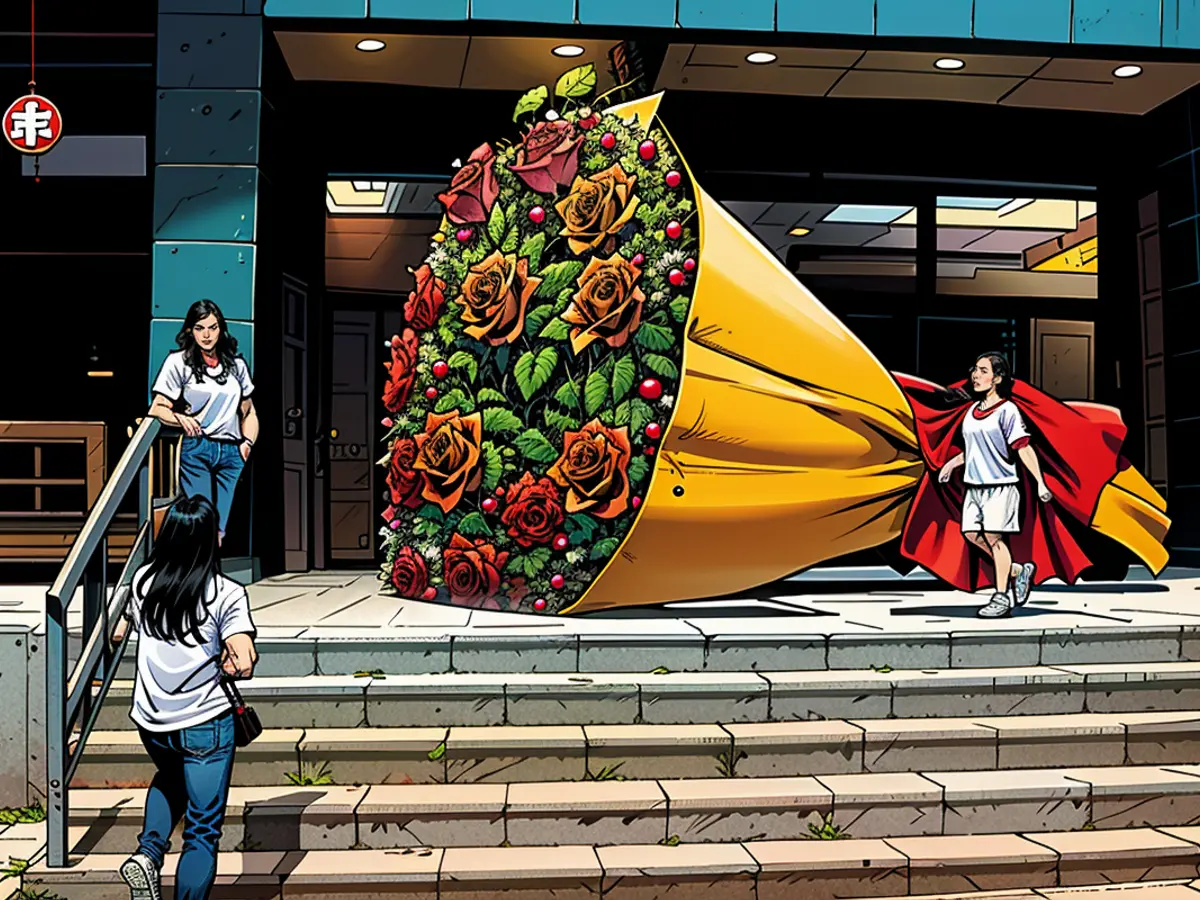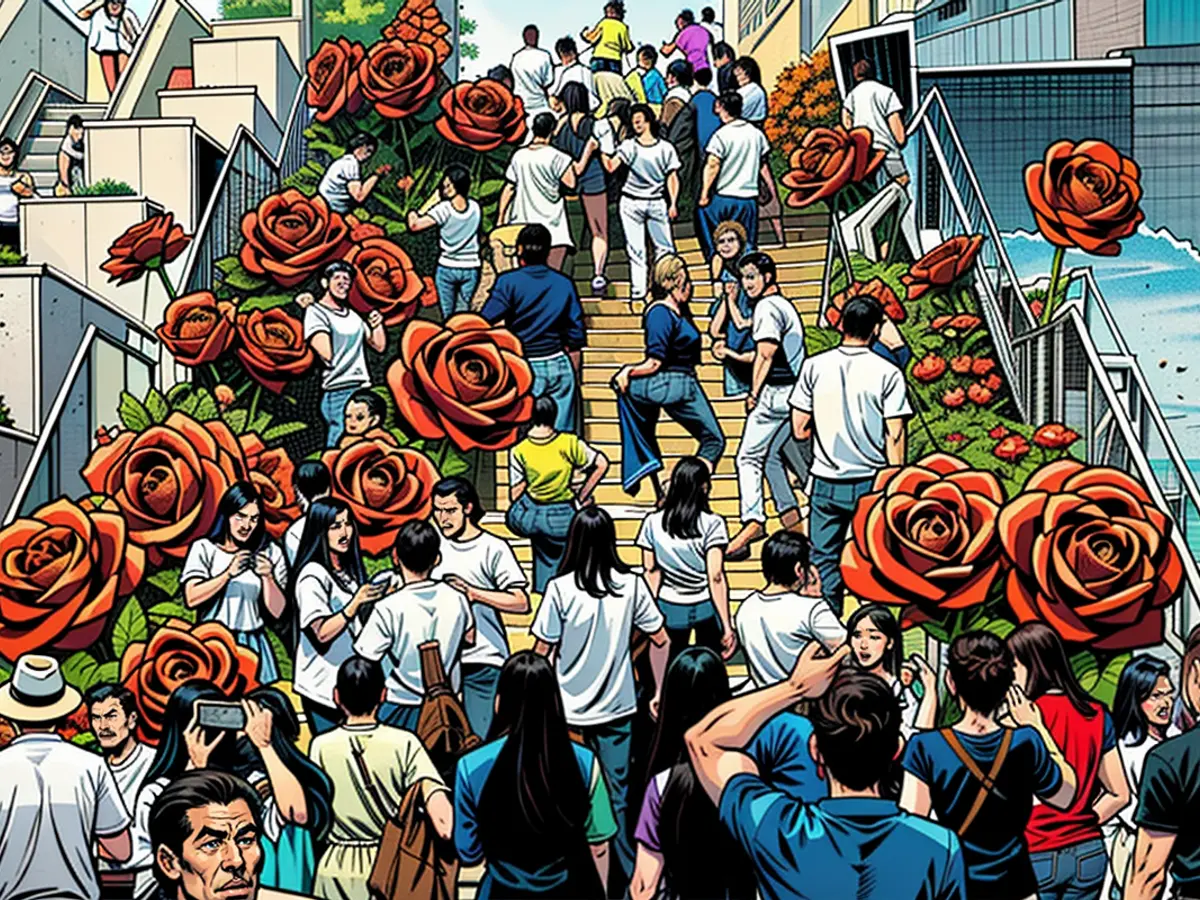Young people in China aren’t spending on romance. That’s a problem
People would flock to social media to show off brand-new iPhones andLouis Vuitton handbags gifted by their partners, as well as photos of dinners at fancy restaurants, during the Chinese version of Valentine’s Day, which typically falls in July or August each year.
That was when China’s economic growth was the envy of the world. This year’s festival was on Saturday, and it was a very different story. People went online to complain about the lack of gift giving and festive spirit, citing a sluggish economy and tough job market.
The hashtag “consumption plummets on Chinese Valentine’s Day. Are young people unwilling to pay the love tax?” became the No 1 trending topic on the Weibo platform on Saturday, drawing 200 million views.
“The Qixi Festival is not as robust as previous years. It feels almost desolate,” one user wrote.
Owners of some flower shops took to Xiaohongshu, another popular platform, to bemoan the lack of customers, posting images of unsold roses lining their stores. CNN was not able to independently confirm their claims.
Other posts recalled forlornly that couples used to have money to spend when the world’s second largest economy was doing well. China is currently plagued by a litany of woes from sluggish consumer spending to a persistent property slump and a mounting debt crisis.

Alfred Wu, an associate professor at the Lee Kuan Yew School of Public Policy at the National University of Singapore, said that young people, who used to be big spenders during Qixi, are struggling to find jobs.
“I think the overall sentiment is very bad and consumers are very conservative,” he said, adding that the negative sentiment has become “the overall pattern” and “not just one festival.”
The anecdotal drop in spending appears to align with the “weak-consumption trend witnessed over the past two years,” said market strategist Yeap Jun Rong from trading provider IG, adding that China’s consumer confidence is “hovering around its record low.”
How China’s lovers behave is an issue for global businesses — and the government in Beijing. In recent weeks, a number of Western multinationals, from cosmetics giant L’Oreal to carmaker Volkswagen, have sounded the alarm over weak demand in China as consumer confidence remains in the doldrums.
A government push
The lackluster mood is also affecting the Chinese government’s efforts to encourage marriage as a way of addressing falling birth rates and an aging population. A shrinking population is likely to be a drag on economic growth.
In the first half of 2024, just 3.43 million couples got married, half the number recorded for the same period 10years ago, according to the Ministry of Civil Affairs.
On Saturday, state broadcaster CCTV released a video featuring rare family portraits of a young Chinese leader Xi Jinping, his wife Peng Liyuan and their baby daughter to celebrate their marriage, which spanned more than three decades.
But the message failed to convince, with people complaining on social media about not being able to start a family because they owed money or have to work long work hours.
“When people born after 1990 are now in [tens of thousands of yuan of] debt, as ‘996007’ becomes the norm, where do people find the mood to date?” the Weibo user asked.
“996” and “007” refer to the notorious work hours demanded by some of China’s biggest conglomerates. The former refers to workers toiling away from 9am to 9pm, six days a week. Some are in a “007” situation, meaning they work every day.

The general pessimism is showing up in trade and other data. According to a CNN calculation based on official customs data, imports of jewellery-grade diamonds in the first half of this year declined by 28% compared to the same period in 2023.
Diamond supplier De Beers said in its 2024 semi-annual report that “ongoing economic challenges” in China have delayed the expected recovery from a sharp decline in 2023.
And according to data released last Friday by the State Administration of Foreign Exchange, China’s direct investment liabilities, a measure of foreign direct investment into the country, dropped by almost $15 billion in the April to June quarter. That’s only the second time this has happened since 1998, underscoring the country’s failure to stem an outflow of capital.
Sounding the alarm
Qixi, which has been celebrated for thousands of years, falls on the seventh day of the seventh month in the lunar calendar. (Most of the world uses the solar, or Gregorian, calendar.) According to legend, it is the one day a year that mythical lovers Niulang, a cow herd, and Zhinu, a weaver, are able to meet on a celestial bridge.
In previous years, it was a fertile opportunity for Chinese and Western companies to market their wares. But that has changed. Global CEOs are no longer able to count on China as a commercial stalwart.
“The only part of the world where consumer confidence remains very low is China,” L’Oreal CEO Nicolas Hieronimus told analysts on an earnings call late last month.
He cited the weak job market and real estate woes as reasons for the malaise. Lower-than-expected growth in the global beauty sector this year is largely a consequence of low consumer confidence in China, he added.
Advertising agency WPP (WPP) said last week that second-quarter revenue in China plunged almost a quarter on the previous year — and the outlook is not much better.

“I’m expecting the second half to remain very challenging in China,” Chief Financial Officer Joanne Wilson added on an earnings call. “I expect for the full year that (revenue) will be down double digits.”
Volkswagen and Mercedes were similarly glum in their assessment of China’s economy.
“I think everybody knows that since we came out of the Covid restrictions beginning of last year, consumer sentiment, it didn’t come back,” Mercedes Benz Group chairman Ola Kaellenius told analysts on July 26. “We don’t know how long it will take, what it will take for China’s consumers to regain that confidence.”
Angelica Chiara Yazbeck and Shawn Deng contributed reporting.
Despite the strength of China's economy in the past, this year's Qixi Festival was marked by complaints about a sluggish economy and tough job market, leading to less spending on gifts and fancy dinners. This has resulted in a decline in sales for businesses, including flower shops, and a decrease in imports of jewelry-grade diamonds.
The Chinese government's effort to encourage marriage as a way to address falling birth rates and an aging population has also been affected. According to data released last Friday by the State Administration of Foreign Exchange, China's direct investment liabilities dropped by almost $15 billion in the April to June quarter, only the second time this has happened since 1998.
(The words 'business' are used in the second and third sentences: Businesses, including flower shops, have seen a decrease in sales, and the Chinese government's effort to encourage marriage is also affecting businesses financially.)








